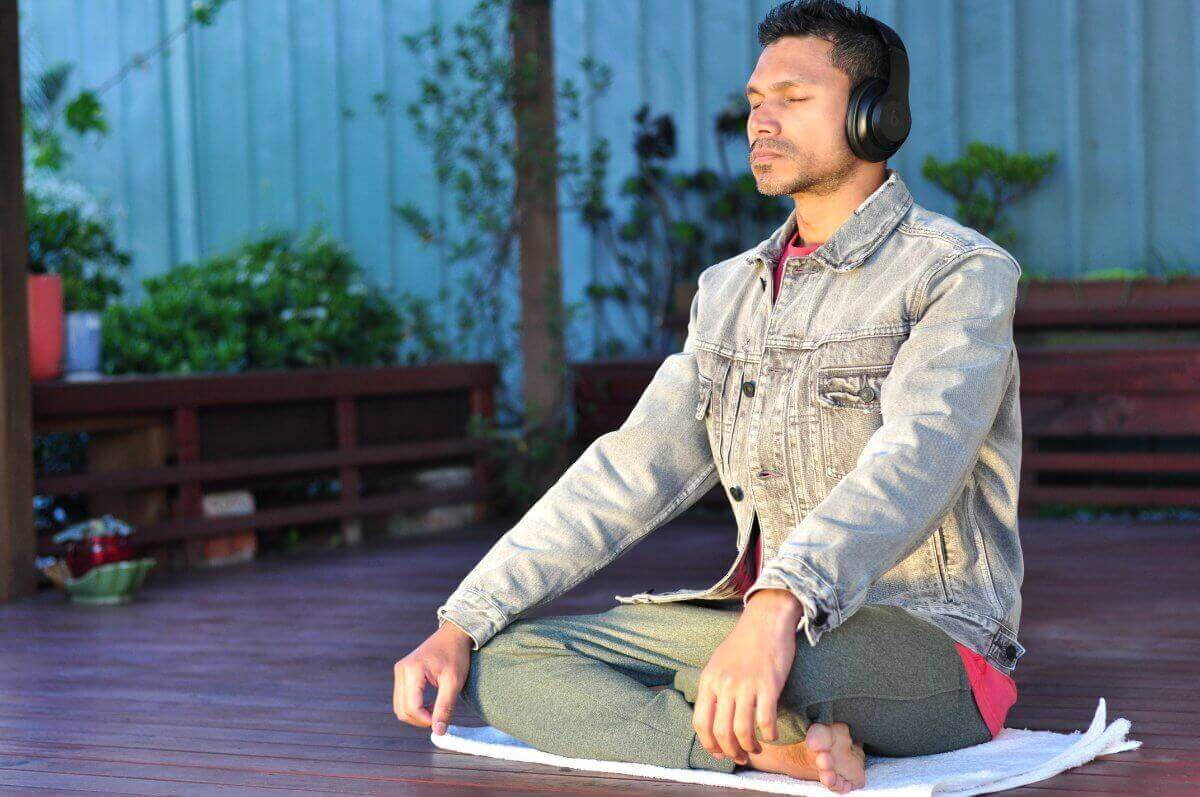Do you ever feel like your life is rushing by, and you’re just trying to catch up? You’re not alone.
Many people today feel overwhelmed by the hustle and bustle of daily life. The answer to this modern-day stress? Mindfulness.
Mindfulness is a powerful tool that can help you tap into a profound sense of calm, improve your memory, boost your concentration, and manage crises more effectively. And the best part? All it takes is just a few minutes each day.
Let’s take a closer look at how to be more mindful in your daily life.
Table of Contents
12 Ways How To Be More Mindful in Daily Life
Check In With Your Body
Our bodies are constantly communicating with us, sending us signals and messages through various sensations.
Unfortunately, in the rush of our daily lives, we often ignore these signs, missing out on crucial information about our physical and emotional well-being. But by practicing mindfulness, we can tune into these signals and respond to them more effectively.
Start by paying attention to your body. Notice the sensations you feel – the tension in your shoulders, the warmth of your hands, the rhythm of your breath.
These sensations are not just physical phenomena; they’re valuable clues to your current state of mind and body. Recognizing and acknowledging these sensations is a powerful way to connect with the present moment and take better care of yourself.
Pay Attention to Your Heart
Just as our bodies communicate with us through sensations, our hearts communicate with us through emotions. Our feelings are a form of body communication that can provide us with deep insights into our mental and emotional states.
By paying attention to your heart, you can become more aware of your emotional landscape. Are you feeling calm and content, or are you feeling anxious and overwhelmed?
Whatever you’re feeling, don’t judge or try to change it. Simply observe it, acknowledge it, and let it be. This mindful approach to emotions can help you navigate your emotional world with greater ease and compassion.
Observe Your Thoughts
One of the most effective ways to cultivate mindfulness in your daily life is to observe your thoughts. This might sound simple, but it’s a powerful exercise that can help you understand the nature of your mind and how it works.
The idea is not to suppress or judge your thoughts but to simply acknowledge them and let them pass.
Consider your mind as a bustling stream and your thoughts as leaves floating on the surface. You’re on the bank, observing. The leaves come and go, just like your thoughts.
This exercise can make you realize that your thoughts are transient. They come and go, and you don’t have to react to each one. It’s a liberating realization that can help you stay calm and focused in the face of adversity.
Fire Up Your Senses
Another powerful way to practice mindfulness is to engage your five senses. This can be as simple as savoring the taste of your morning coffee, listening to the sound of the rain, or feeling the texture of your clothes against your skin. By focusing on these sensory experiences, you can anchor your mind in the present moment.
Try this:
Close your eyes and focus on your breathing. Then, start noticing the sounds around you. What do you hear? Next, focus on what you can smell, taste, and feel. You’ll be surprised how this simple exercise can help you feel more grounded and present in the moment.

Be Mindful in Your Interactions
Our interactions with others can often be rushed, distracted, or judgmental. By practicing mindfulness in our interactions, we can change this.
Mindfulness allows us to be fully present in our conversations, to really listen to what the other person is saying, and to respond with understanding and compassion.
Being mindful in our interactions doesn’t mean we have to agree with everything the other person says. It simply means we give them our full attention without judgment. This can lead to more meaningful and fulfilling relationships, better communication, and a deeper understanding of the people around us.
Observe Your Surroundings
Ever noticed the subtle rustling of leaves in the breeze or the soft chirping of birds in the morning? If not, it’s time to start paying attention!
One of the easiest ways to be mindful in everyday life is to simply observe your surroundings. It’s all about tuning into the world around you.
Instead of rushing through your day with a laser focus on your to-do list, take a moment to pause and soak in the beauty of nature. You’ll be surprised how this small shift can make a big difference in your overall state of mind.
Practice Gratitude
Another powerful way to cultivate mindfulness is through the practice of gratitude. Instead of dwelling on what’s going wrong, try focusing on what’s going right.
Start each day by listing three things you’re grateful for. They don’t have to be big, life-changing events; even the smallest things, like a warm cup of coffee or a kind word from a friend, can make a huge impact.
This simple act of acknowledging the good in your life can bring you back to the present moment, helping you to appreciate the now instead of worrying about the past or the future.
By practicing gratitude, you’ll find yourself more grounded, more mindful, and more content with your life.

Practice Mindful Eating
How often do we find ourselves eating without really paying attention to what we’re consuming? This mindless eating can lead to eating way too much, not enjoying our food, and even health problems. Mindful eating, on the other hand, can help counteract these issues.
Mindful eating means being fully present for each bite. It means savoring the taste, texture, and aroma of your food rather than just consuming it as quickly as possible.
It involves recognizing the signals your body sends you about hunger and fullness and responding to them appropriately. This can lead to better digestion, a healthier relationship with food, and even weight loss.
Engage in Activities Mindfully
Our daily life is filled with a multitude of activities that can be transformed into opportunities for mindfulness practice. This could be anything from washing the dishes to walking the dog.
The key is to be fully present and aware during these activities. Instead of letting your mind wander, focus on the task at hand. Pay attention to the feel of the water on your hands when you’re washing the dishes or the sensation of the ground beneath your feet as you walk.
By engaging in activities mindfully, you’re not just going through the motions but truly experiencing each moment. This is an effective way to cultivate mindfulness and make it a part of your everyday life.
Pause Throughout the Day
In our fast-paced world, it’s easy to get caught up in the hustle and bustle and forget to take a moment to breathe. This is where the practice of pausing comes in.
Pausing throughout the day to practice mindfulness exercises can have a profound impact on your overall well-being. It’s like pressing the reset button, giving your mind a much-needed break from the constant stream of thoughts and worries.
One powerful technique is the practice of mindful breathing. This involves focusing on your breath, observing the sensation of inhaling and exhaling, and letting go of any distracting thoughts.
Another technique is progressive muscle relaxation, where you tense and then release different muscle groups in your body. This not only helps to relieve stress but also brings your attention back to the present moment.
Focus on Your Breath
Have you ever noticed how your breath changes when you’re stressed, excited, or relaxed? It’s a subtle but powerful indicator of your emotional state.
One of the most effective methods to foster mindfulness is to focus on your breath. By doing so, you anchor your attention to the present moment.
When you find your mind wandering, gently bring your focus back to your breath. Notice the cool air as you inhale and the warm air as you exhale. Feel your chest rise and fall with each breath.
This simple act of focusing on your breath can help you stay grounded in the present, reducing anxiety and promoting a sense of calm.

Practice Active Listening
We’ve all been guilty of half-listening to someone while formulating our own response. This habit, though common, can hinder our ability to truly connect with others. To enhance the quality of your interactions, practice active listening.
Active listening involves giving your full attention to the speaker and absorbing what they’re saying without interruption or judgment. It’s about being fully present in the conversation and acknowledging the speaker’s thoughts and feelings.
This not only improves your relationships but also fosters mindfulness by training your mind to focus on the present moment.
Conclusion
Mindfulness isn’t something you achieve overnight. It requires practice, patience, and a willingness to gently guide your attention back to the present moment. But the rewards are worth the effort.
A mindful life can lead to reduced stress, improved mental health, and enriched relationships. So, take a deep breath, observe your surroundings, practice gratitude, and listen actively. Your journey to a more mindful life starts now.





